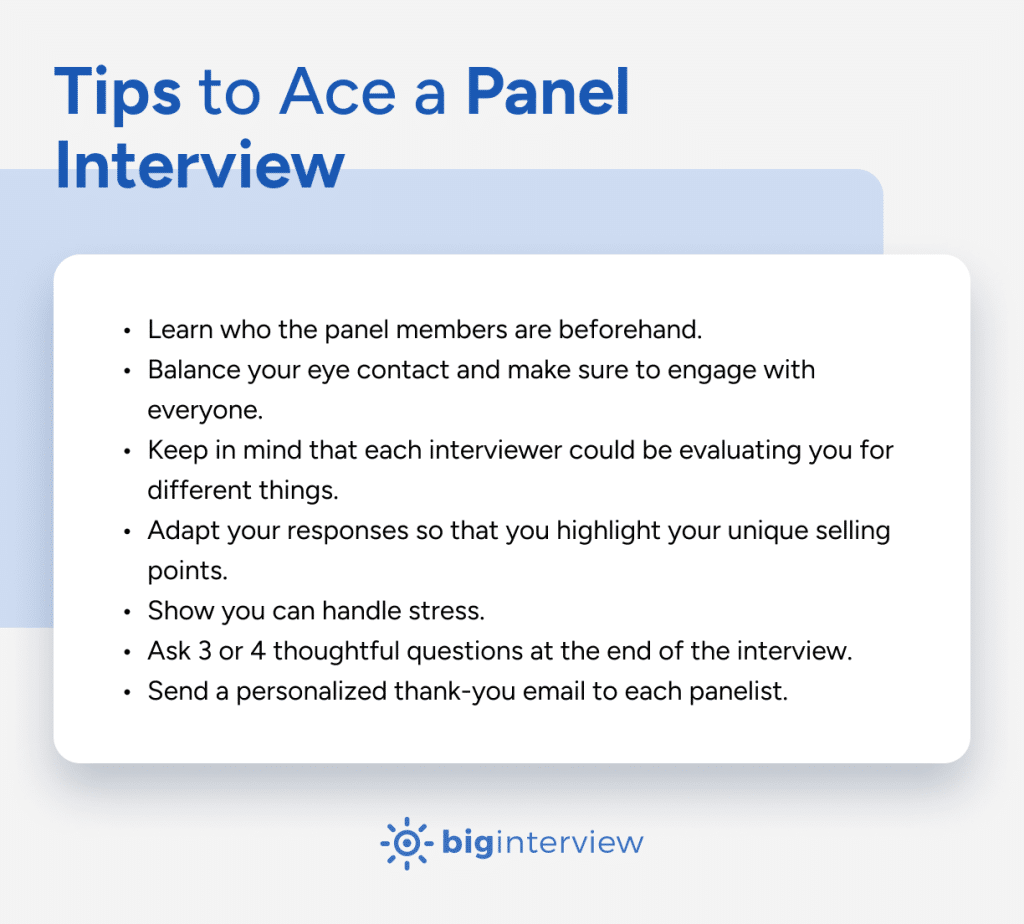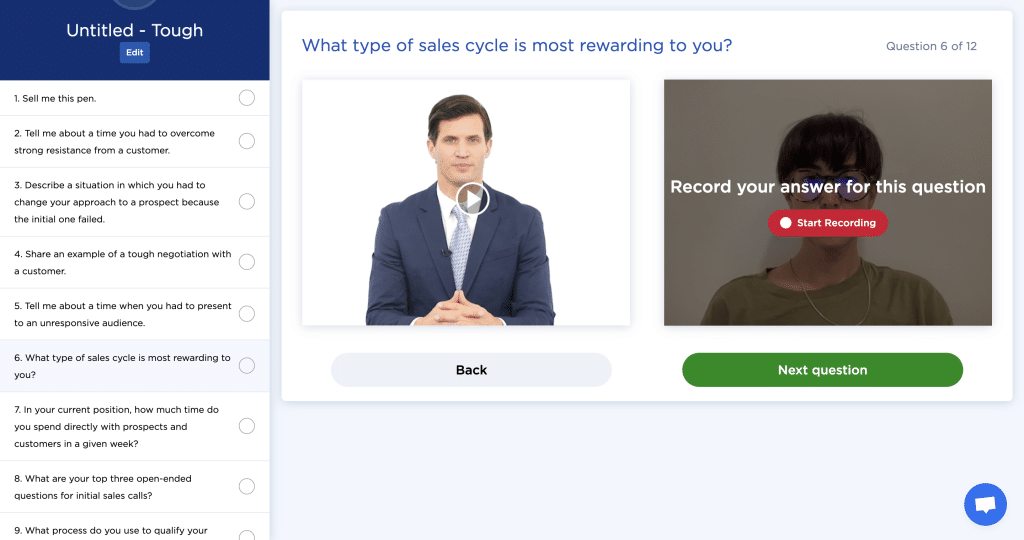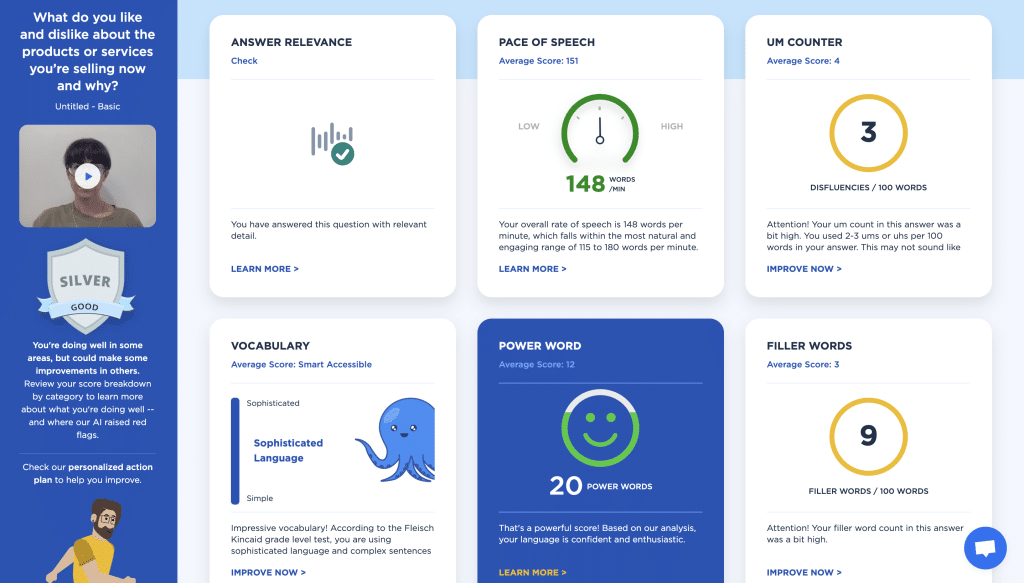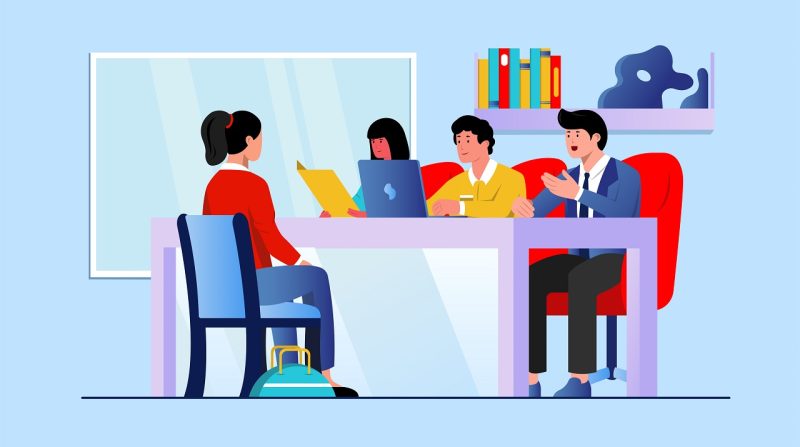Panel interviews can feel like interrogations and make you uncomfortable.
After all, you’re there on your own — facing a panel of interviewers. The imbalance is a lot more evident than in regular, one-on-one interviews.
But that doesn’t mean you can’t walk out confident.
In this article, we’ll help you:
- Understand what panel interviews are and why you may be invited to one.
- Prepare for a panel interview in 5 simple steps.
- Get 7 career coach-vetted tips to nail your next panel interview.

Want to get an offer after every interview? Our interview preparation tool will guide you through all the questions you can expect, let you record and analyze your answers, and provide instant AI feedback. You’ll know exactly what to improve to turn your next interview into a job.

Don’t waste days compiling overused interview techniques. Get original answers to every single question you could expect.
What Is a Panel Interview?
A panel interview is a format where a candidate is interviewed by multiple interviewers simultaneously. This type of interview usually includes representatives from various departments within the company, such as HR, the hiring department, and sometimes future team members.
The panel may also include higher-level executives if you’re interviewing for one of the key roles.
Why are panel interviews used?
A panel interview is a strategic choice for many organizations because it saves everyone’s time and allows for a collaborative approach.
Some benefits of panel interviews:
- They let many people evaluate you at once. A panel brings together varied perspectives, ensuring a 360-degree assessment of a candidate’s capabilities and potential fit within the company. With each interviewer focusing on different areas of your expertise, they can effectively learn about your competencies and traits that might otherwise be overlooked.
- They help reduce bias. When people from different departments and backgrounds participate, it’s easier to override individual biases and ensure a fair evaluation process. This absolutely works in your favor.
- They make the interview process more efficient. By consolidating individual interviews into one comprehensive session, companies save a lot of time (including your time!) while still conducting a thorough assessment.
- They help to find the right fit. Any new hire should fit the company’s culture. A panel can better determine if your values align with theirs. For roles that require teamwork, a panel of interviewers can provide a better assessment of how well you can collaborate and communicate with different team members and departments.
The panel interview is commonly used for academia, government, and higher-level corporate roles and settings where the complexity and scope of responsibilities span across different departments.
How are panel interviews different from one-on-one interviews?
The key difference between panel interviews and one-on-one interviews is not so much the number of interviewers, but the dynamic and interview structure that this setup creates.
Here’s a deeper look into how a panel interview is different:
- There will be more interviewers. In a panel interview, you’ll be cross-examined by a group typically ranging from three to six interviewers. The panel may include HR personnel, potential direct supervisors, department heads, and potential colleagues. Each panel member represents a different perspective and set of interests regarding your suitability for the role.
- The dynamics will be different. Interacting with multiple interviewers simultaneously changes the interview dynamics. You’ll have to read the room and manage attention between several interviewers, pick up multiple people’s reactions, and then quickly adapt your responses. Remember to maintain eye contact with all panel members, and manage the flow of conversation to ensure that each interviewer feels acknowledged.
- It lasts longer and goes more in-depth. Panel interviews may include multiple segments, such as presentations, skill assessments, and situational questions that require detailed responses.
How to Prepare for a Panel Interview
To do well in a panel interview, follow these 5 steps:
Research the company culture and values
Dive deep into the company website, read through their mission statement, scour their social media profiles, and look for news articles or press releases to get a holistic view of their identity and priorities.
This will help you to align your answers with the company’s ethos. It will also show you’re genuinely interested in becoming a part of their team.
Get intel on the background of panel members
Knowing your interviewers can help you personalize your responses and build a connection with each panel member. Do your best to find out who the panel will consist of. You can ask the person who arranged the interview to tell you a bit about the panel you’d be meeting with.
Once you know who they are, check them out on LinkedIn to get a better idea of what exact roles they have in the company, what interests they have, and how to best approach them.
Company websites often have bios for their leadership team, which can provide additional context.
Research role-specific knowledge and skills
Analyze the requirements of the role you’re applying for. You need to go beyond the job description and explore the broader context of how this role fits within the team and contributes to the organization’s goals.
This might involve researching industry trends, required technical skills, and common challenges faced in such positions. Demonstrating this level of understanding and attention to detail in your answers will show your readiness to hit the ground running.
Use your knowledge of who the interviewers are to compare their roles to the job description. It will be easy to guess what questions you’ll be asked and who you should emphasize what with.
For example, if you’re interviewing for a sales role that mentions working with customer success on renewals, you’ll want to prepare for questions related to your experience with upselling and renewing clients, as well as your ability to make new sales. And if both the Customer Success Manager and Sales Manager are in the panel, you’ll want to address them both.
Prepare answers to common panel interview questions
Some panel interview questions will be specific, depending on the role and the interviewers, but there are questions that are pretty standard.
Check out these dedicated guides on how to answer some of them:
- Tell me about yourself.
- Why do you want to work here?
- What can you contribute to the company?
- Why are you interested in this position?
- What are your biggest strengths?
- What is your greatest weakness?
- What motivates you?
- Where do you see yourself in 5 years?
- What are your salary expectations?
You’ll also get a lot of behavioral questions, so be ready to answer them and get familiar with the STAR format.
Practice mock panel interviews
The dynamics of a panel interview can throw you off balance if you’re not prepared. Ask friends or mentors to act as panel members in mock interviews.
This will help you get comfortable directing your answers to multiple people, manage your time effectively, and handle the pressure of being in the spotlight from various angles.
Even if you’re preparing solo, it will still be useful to practice answering common and industry-specific questions. This way, you’ll have all the facts and examples ready and you can focus on your delivery more. An interview simulator software can help polish everything up.
To get back to our previous example — if you’re interviewing for a sales position, you could go over the most common questions for your role, then practice answering them on video.

Once you’re done, you can get an AI analysis of your answer, including your body language, tone, and use of filler words.

Seven Panel Interview Tips to Ace Your Next Interview
Here are 7 simple tips that have been vetted by our chief coach and career expert, Pamela Skillings, to help you nail your next panel interview.
Build rapport with each panel member
Here’s how you can establish a connection with each interviewer and answer their questions smoothly.
- Address them by name. Make it a point to learn and use the names of the interviewers during the session. Addressing someone by name is a basic yet powerful way to build rapport and show attentiveness.
- Tailor responses to departmental interests. The research you did on the panel members’ roles within the company pays off here. When responding to questions, subtly tailor your answers to reflect an understanding of each interviewer’s departmental focus. For instance, when speaking to a marketing head, highlight your experience or ideas that align with marketing objectives and challenges.
- Answer questions one at a time. In situations where multiple questions are posed by different interviewers, acknowledge each question first. Then, proceed to answer them one at a time. This organized approach ensures that you address each panel member’s query without overlooking or ignoring anyone.
- Acknowledge every interviewer. Even as you respond to one question, maintain eye contact with the other panel members occasionally. This inclusive engagement showcases your ability to communicate effectively in a group setting and ensures that no panel member feels sidelined.
Balance eye contact and attention
Panel interviews can be more challenging than regular ones because they require you to engage with more than one person at the same time. This goes for verbal communication, but also for eye contact and attention you give to each panelist.
Try to distribute your eye contact evenly, so that no member feels ignored or excluded. Don’t fix your gaze or turn your body to one person only. Make sure you give everyone equal attention, even if some members of the panel are less talkative than others.
💡Pro tip: If you’re in a virtual panel interview, the best thing to do is try and look directly at the camera. It will be uncomfortable at first (you may need to put in a conscious effort), but it will seem like you’re looking at everyone.
Highlight your unique selling proposition
As you answer questions, especially the introductory ones like “Tell me about yourself” or “Why should we hire you?”, make sure to explain what sets you apart from other candidates.
Remember that your responses are evaluated by diverse panel members who will likely have different areas of focus and interests based on their roles.
Let’s say you’re a Product Owner interviewing for a job at a tech company. Your panel could consist of an HR representative, Head of Engineering, Head of UX, Product Marketing Director, and other team leads whose departments you’d have to work with on a daily basis.
The HR person would be interested in how you fit the culture and your soft skills like collaboration or your approach to conflict resolution and handling difficult situations with team members.
The Head of Engineering would want to know about your experience in working with development teams, your approach to prioritizing, managing technical debt, or how well you can translate technical requirements into user stories.
The Head of UX design would be scanning you for user research or your understanding of accessibility.
Finally, the Product Marketing Director would be interested in your experience with product launches and collaboration with content teams on the creation of marketing collateral, product videos, or competitor research.
You’ll have to tailor your responses to resonate with everyone and highlight different strengths and skills that each of them will find important. And if you don’t have direct experience with all of this, you can mention collaborating with people who do.
Show you can handle stress and criticism
Panel interviews are a great way for the hiring team to test if you’re adaptable and resilient to stress. This is essential for management roles or roles requiring strong interpersonal skills and cross-departmental collaboration.
Come well-prepared. When you know what questions to expect, who you’re talking to, and how you want to present yourself, it will be a lot easier to stay calm and professional.
Here’s an in-depth guide that can help: Interview Anxiety: How to Calm Nerves Before an Interview.
Ask thoughtful questions
You shouldn’t miss the opportunity to ask 3–4 questions at the end. Ideally, prepare one question for each panelist. This is a great way to show you’re really interested in the position and would like to learn more about the company, processes, growth opportunities, and the role itself.
Also, make sure to address the right questions to the right panel members.
💡Pro tip: Don’t just prepare questions beforehand and stick to them. As the conversation unfolds, and especially if anything is unclear, take mental notes of things you’d like to learn more about. Remember that the interviewers expect you to ask questions. Having none will probably get you flagged.
Here are some smart questions you can ask: 40+ Smart Questions to Ask at the End of Any Job Interview.
Close the interview strongly
In a panel interview, it’s especially important to leave a positive impression on all panel members since they collectively influence the hiring decision.
Towards the end of the interview, you’ll get the chance to ask questions and also have your final opportunity to explain why you’re the right fit for the position, and express gratitude for the opportunity.
Here’s what you should do:
- Thank everyone for the opportunity to interview for the position.
- End on a positive note and express your enthusiasm to contribute to the company’s success.
- Show them you’re open to further discussions. Make sure they have your contact information and encourage them to reach out with any further questions.
Follow up after the interview
The end of the interview doesn’t mean you just sit and wait.
In the next 24 hours after the interview, send personalized thank-you emails to all members of the panel.
Here’s our guide on how to write a perfect thank-you email. This short video can help too.
Summary of the Main Points
Here’s a quick rundown of everything you need to know about acing a panel interview.
- A panel interview is a format where you are interviewed by multiple interviewers simultaneously.
- They’re commonly used for academia, government, and high-level corporate roles where the complexity and scope of responsibilities span different departments.
- Panel interviews usually last longer than one-on-one interviews.
- To prepare for a panel interview, you need to research the company culture and values, learn about the panelists’ roles in the company, be ready to speak about your role-specific knowledge and skills, prepare answers to common questions, and practice answering questions in a panel setting.
- Make sure to engage with each panelist and balance your eye contact and attention.
- Show them you can handle the stress of being cross-examined by staying focused and highlighting your unique selling points and skills throughout the interview.
- At the end, ask 3–4 questions at the end of the interview to cement your impression and show you’re genuinely interested.
- After the interview, write personalized thank-you emails to each panel member.
FAQ
Is a panel interview a good sign?
Yes, because it means they’re interested in working with you. That said, it’s as good a sign as any other interview. In other words, it doesn’t mean you’ve made it further than someone who’s been invited to a one-on-one interview. It’s just another type of interview and you have to put more thought into preparation because there will be more people screening you.
What are the best questions to ask in a panel interview?
Ask questions that will show your interest in the position, but make sure they help you learn more about the team dynamics, growth opportunities, and how the role contributes to the broader company goals. You can ask one question about the role, one about the company culture, and one about growth.
What is the difference between a panel interview and a group interview?
Panel interviews are focused on evaluating one candidate from multiple organizational perspectives, while group interviews assess multiple candidates’ abilities to interact and work in a team setting. The choice between a panel or group interview often depends on the nature of the job, the level of the position, the company’s culture, and the specific qualities the employer is looking to assess in candidates.
How to prepare for a panel interview on zoom?
To prepare for a panel interview on Zoom, make sure to test your connection, audio, and video. As with all other video interviews, you should choose a quiet, well-lit space and a professional background. Try to find out who the panelists will be and research their background and roles in the organization. Make sure to maintain eye contact with the camera. Since you’ll be interacting with multiple interviewers, make an effort to address each one during the interview.
What to do if only one member of the panel asks questions?
If only one member asks questions in your panel interview, you should direct your response to that person, but also try to engage with all other panel members. You can briefly glance at the other panelists and invite them to provide additional input or ask further questions. No matter the dynamic of the panel, try to keep your composure and focus on delivering your responses confidently and professionally.
I forgot the name of one panel member. Can I ask them to repeat their name?
If you forget the name of a panel member, it’s best to be tactful and wait for another panel member to call them by the name. If that doesn’t happen, you can try to avoid using their name in your response. As a last resort, you can say something like, “I apologize, could you please remind me of your name?”
______________________________
Need a hand? There are 2 ways we can help you:
1. Learn how to turn more job interviews into job offers here. (Rated with 4.9/5 by 1,000,000 users)
2. Learn how to successfully negotiate a better salary. (Take a sneak peek of one lesson for free here)
